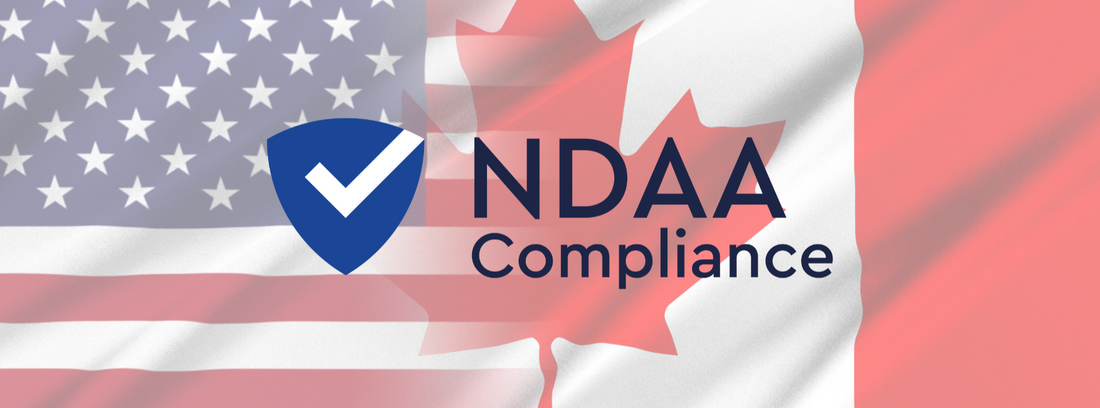
Why is NDAA compliance important? (In Canadian Security Context)
Share
NDAA compliance, part of the U.S. National Defense Authorization Act, enhances security by restricting the use of equipment from manufacturers linked to national security risks. By adhering to these standards, organizations reduce the risk of cyber threats like espionage and data breaches, ensuring their security systems are robust and reliable. Compliance also protects sensitive information, such as surveillance footage and personal data, safeguarding against potential legal and reputational damage. Additionally, prioritizing NDAA compliance builds trust, showing a commitment to ethical practices and proactive risk management. Investing in compliant systems also future-proofs your security infrastructure, keeping it aligned with evolving regulations and industry standards.
NDAA Compliance and Its Impact on Canada
While the NDAA is a U.S. law, its influence reaches far beyond American borders, including into Canada. Although Canada does not have its own NDAA, the regulation has significant effects on Canadian businesses, especially those that engage in cross-border trade with the U.S. or rely on technology and security equipment that could be subject to these restrictions. Here's why NDAA regulations are crucial for Canadian companies:
1. Impact on Canadian Businesses
Canadian companies that work with U.S. government agencies, contractors, or businesses often need to ensure their security systems are NDAA-compliant. This is not just a formality—U.S. regulations may require that any foreign partners or subsidiaries also adhere to NDAA standards, particularly if the products or services provided could impact U.S. national security. For example, a Canadian tech company supplying video surveillance equipment to a U.S. government project must ensure their products do not include components from banned manufacturers to remain eligible for these contracts.
2. Supply Chain Considerations
The NDAA restricts the use of equipment from specific manufacturers, particularly those with ties to certain foreign governments. This affects the global supply chain, including in Canada. Canadian companies that source technology or components for security systems must be aware of these restrictions to avoid using non-compliant equipment. This is particularly important for businesses in Canada that export products to the U.S. or work closely with U.S.-based companies, as non-compliance could jeopardize these business relationships.
3. Compliance in Public and Private Sectors
Even though the Canadian government has not enacted legislation identical to the NDAA, public sector entities and private businesses in Canada may still voluntarily comply with NDAA standards. This is often done to ensure alignment with international security best practices, particularly when handling sensitive data or critical infrastructure. Additionally, organizations that wish to maintain eligibility for cross-border contracts or collaborations with U.S. entities might adopt NDAA-compliant technologies as a precautionary measure.
4. Legal and Strategic Alignment
Canadian organizations that operate internationally often seek to align their legal and security practices with major trading partners like the United States. By adopting NDAA-compliant technologies and practices, Canadian companies can demonstrate their commitment to high security standards, potentially making them more attractive to U.S. partners and clients. This alignment is particularly crucial in industries such as defense, telecommunications, and critical infrastructure, where security concerns are paramount.
5. Risk Mitigation
NDAA compliance helps Canadian businesses mitigate risks associated with cybersecurity and data breaches. By avoiding the use of banned or restricted equipment, companies reduce the likelihood of vulnerabilities in their security systems that could be exploited by malicious actors. This proactive approach to security not only protects the company’s assets but also its reputation, especially if it operates in sectors that are highly sensitive to security breaches.
6. Influence on Canadian Regulations
While Canada does not have an NDAA equivalent, U.S. regulations like the NDAA often influence Canadian policy. As security concerns and international relations evolve, Canada may consider adopting similar restrictions or guidelines, particularly if it aligns with national security interests. For now, Canadian businesses and government agencies are encouraged to stay informed about NDAA regulations and consider their implications for cross-border operations.
Conclusion
NDAA compliance is critical for maintaining security, legal standing, and trust—whether you’re operating in the U.S., Canada, or globally. For Canadian organizations, understanding and adhering to NDAA compliance is essential, not only for maintaining cross-border partnerships and securing sensitive information but also for aligning with international security standards. By prioritizing NDAA compliance, Canadian companies can protect themselves from potential risks, build trust with stakeholders, and position themselves as reliable partners in the global market.
